How Long Does It Take For An Animal To Adapt To Its Environment
What are animal adaptations?
Animal adaptations are changes that animals make in club to survive. These changes help animals to meet their basic needs for air, food, water, shelter, and space to live. So, just how do animals adapt to their environs?
Behavioral Adaptations
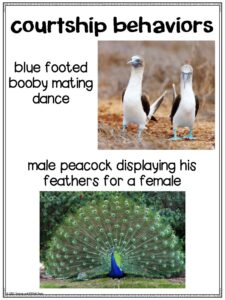
Animals make behavioral adaptations. Behavioral adaptations are the fashion an animal acts. There are ii types of behavioral adaptations.
Inherited Behaviors
Inherited, too known as instinctual, adaptations don't have to exist learned. They come naturally. Examples of these are:
- Migration
- Hibernation
- Being nocturnal
- Defensive behaviors
- Mating or courtship behaviors
Learned Behaviors
Learned behaviors are a result of experience. Young animals learn things by observing their parents or other animals in their species. Some of those behaviors include:
- How to find nutrient
- Making a shelter
- How to communicate
- How to get forth in a grouping
- Looking out for predators
Concrete Adaptations
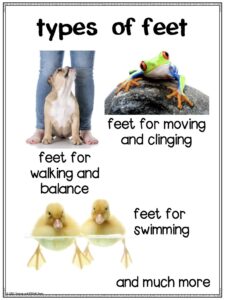
Animals brand physical adaptations to assist them live in their environment. Concrete, or structural, adaptations are concrete features that change. Animals that alive in cool environments demand dissimilar physical adaptations than animals that alive in a warm habitat. These features tin include:
Body Parts
- Types of feet
- Kinds of claws
- Types of mouths and/or beaks
- Blazon of body covering
Color and Pattern
- Cover-up
- Mimicry – an accommodation that helps a harmless creature expect or sound similar a harmful animal in order to protect itself
Physiological Adaptations
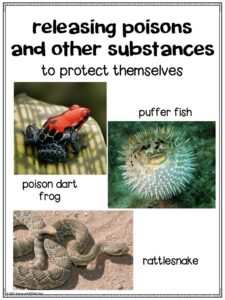
Unlike physical adaptations, which can be seen, physiological adaptations occur internally. Examples of how animals adapt to their environment physiologically are:
- Regulating trunk temperature
- Releasing poisons and other substances
Examples of Animal Adaptations
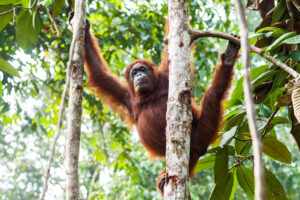
Orangutans accept adjusted to living in the rainforest. These mammals employ their flexible legs and arms to move amongst the trees. Orangutans' artillery are longer than their legs. Their arms are stronger than their legs so that they can hold the weight of their bodies. They are able to use their fingers as humans practice. They use these to grasp things like nutrient and tools. Orangutans have nighttime dark-brown eyes to protect them from the sun.
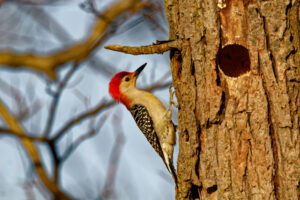
Woodpeckers accept potent bills for drilling holes in trees. They have a spongy skull that absorbs the bear on of the pecking. Woodpeckers use their long, sticky tongue to get insects out of the holes so they can eat them. Their stiff tail feathers aid them to balance.
How Exercise Animals Adapt to Their Environment: Instruction Ideas
- First, read about how different animals conform to their habitats. Animals that live in the desert demand to make different adaptations than animals that live in the arctic or in the body of water. Get to the library and check out books on various habitats and the animals that live in them.
I am writing this mail in celebration of selling hundreds of honour-winning books to school districts this past summer. This book is best for elementary grades. One page gives a description of the habitat, and the next few pages prove animals that live in that habitat and the adaptations they make to alive there successfully. This continues for multiple habitats.
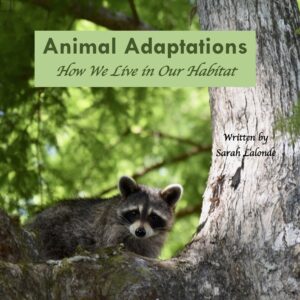
Author, Sandra Markle has a wonderful series of books for children called What if Y'all Had… ( an animal tongue, fauna hair, etc.). Students ever get a good giggle out of these!
Nosotros besides accept reading passages in our TpT shop about animal adaptations. Students read these while filling out a graphic organizer to proceed them on task. We accept a passage nearly mimicry likewise.
- Enquire students to pattern a new brute. With immature students, I find it easiest to bear witness them lots of pictures of different animals. Then they take one physical characteristic, change it and tell how this will help the beast. For older students, we have designed job cards similar this. Students use this data and draw this beast, characterization its adaptations, and name the beast.
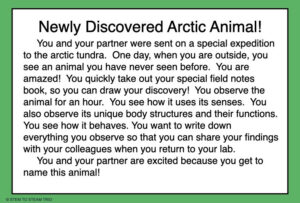

We created a set of posters with pictures that show all of the adaptations listed in this mail service.
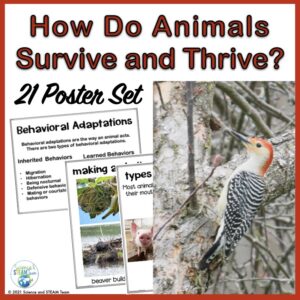
So, at present you know how animals adjust to their surround. Teaching this engaging concept should be a breeze for you!
And call back, it'due south all science!
Sarah
Source: https://scienceandsteamteam.com/how-do-animals-adapt-to-their-environment-awesome-information-for-teachers/
Posted by: yearbywartime.blogspot.com

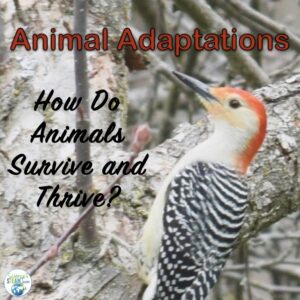
0 Response to "How Long Does It Take For An Animal To Adapt To Its Environment"
Post a Comment